- Home
- Mack Reynolds
Space Visitor Page 3
Space Visitor Read online
Page 3
From time to time, minor staff difficulties popped up due to the pairing off, but on the average, the persons mutually selected remained together for the whole six months. There was another very good reason for the lack of conflicts in general: their training included an hypnotically induced suggestion that made them unable to dislike, or in any manner wish ill of, any of the others on the team.
Max Zimmerman and Li Ching undressed and prepared for bed in thoughtful silence. Their quarters were far from Spartan. Every effort had been made to equip the Luna Hilton with all the Earth comforts. The very low gravity took some getting used to, of course, but otherwise one could have imagined oneself in a small hotel suite back home.
Usually they would have made love at this point, but tonight there were other things on their minds.
“Max, there are some very frightening aspects to all this. The more I think about them, the more frightening they become.”
“I know,” he said, putting an arm about her shoulders and bringing the warmth of her body to him. “What in particular are you thinking about?
I’ve dreamed up some frightening aspects of my own.”
“If that thing has been there for millions of years, by this time how much further advanced is this other intelligent life form? They were already further along than we are now when they made it. What are they by now, Max—gods?”
“Probably,” he muttered. But then, “Of course, there’s always the possibility that they are no longer in existence.”
“How could that be?” she asked, puzzled.
“Perhaps something has happened to them. Perhaps the sun system in which they originated went into nova. Perhaps they were wiped out in an interplanetary or even interstellar conflict, though that would seem unlikely. Perhaps they destroyed themselves in a war, as we threaten to do here on Earth. Perhaps a lot of things. Perhaps they became bored and committed suicide.”
“Max, don’t be ridiculous.”
He looked at her without smiling. “It’s not impossible, you know. Our own race is now on the verge of attaining immortality, due to the rate of medical and biological breakthroughs. Suppose we do achieve it. Do you, for instance, want immortality, Li Ching?”
“Why, I’ve never even thought about it, but… of course. It would be great to live for an indefinite time, instead of the hundred or so years we can figure on now.”
He frowned before saying doubtfully, “I don’t know. I guess that the first thousand years would be the easiest.”
“Thousand years?” she repeated blankly.
“Yes, of course: immortality. After about ten thousand years, don’t you think you might experience a little weariness?”
She thought about it for a moment but then shook her head. “No. If the race was as advanced as all that, they would devise some method of maintaining the desire to live, find some great purpose to keep you going.”
“Possibly,” he said. “But the fact of the matter is, Li Ching, that life is an accident. It has no purpose.”
“That’s rather cynical, isn’t it? It doesn’t sound like you, Max.”
“I wasn’t trying to be cynical, simply realistic. Take our life form, mankind. One day, the sun will cool and life as we know it will be impossible in the solar system.”
“Perhaps by that time we will have the know-how to move to other sun systems.”
“Perhaps,” he admitted. “But one day the galaxy itself will cool, or in some other manner cease to exist as a place where life can continue.”
“Maybe by then the race will be so unbelievably advanced that we will be able to travel to other galaxies.”
“Maybe. But some day, Li Ching, the universe itself will stop… No, there is no purpose in life. A million years ago, an apeman was probably walking along a jungle path in what is now South Africa when a large predatory cat came along and killed and ate him. What was the purpose in his ever having lived? To breed and to become my ancestor? A million years from now, I will not be remembered as an individual any more than you am and I remember that apeman. What’s the purpose in my living?”
“I don’t know,” she said softly. “It seems so worthless, the way you put it.”
“In the long run, it is worthless. I suppose I’m a hedonist: eat, drink, and be merry for tomorrow we kick off. The only thing that makes sense is to live it up while you are here, have as good a time as you can.”
He lay there for a long time without speaking, then turned his head.
Li Ching was asleep. He gently removed his arm from about her and turned over. Just before he fell asleep, he wondered why, if the other life form was able to send a space probe to Luna a million years and more ago, it had never sent another one.
Not surprisingly, in their own quarters Werner Brecht and Mary Lou Pickett had touched on some of the same aspects of the question.
As opposed to Max and Li Ching, however, they had made love first, to relax the tensions that had built up so strongly the past few hours. Now both lay staring up at the ceiling.
Mary Lou said finally, “Werner, is it necessary that this extraterrestrial life form be far more advanced than we are in the sciences?”
He frowned. “How could they be otherwise if they were able to build a spaceship that could travel light years in distance? It’s all we can do now to explore the nearer planets in our own solar system.”
“Yes, I know, but… well, man is a rapidly developing race—especially this past century. Couldn’t they be a very slowly developing life form? That is, perhaps it took them millions of years to get to the point where they could get into space. But look how fast we go: less than seventy-five years after the Wright Brothers made that first flight of theirs at Kitty Hawk, we were on the moon. Orville Wright actually lived to see first spacecraft, the German V-2.”
“You think that possibly they have the equivalent of a lower I.Q. than we boast, eh?”
“Why not, darling? Suppose you had a life form with an average I.Q. of fifty say, or even less, as opposed to the average human I.Q. of a hundred. Given time, lots of time, wouldn’t they slowly evolve to the point where they would have the technology to build spaceships?”
“No, I don’t think so. This isn’t my field, of course, but I don’t believe that’s the way it works. You see, that old story about insects—ants, termites, cockroaches, or whatever—someday evolving and taking over the world is nonsense.”
“Why?”
“Because,” he told her, “you need three things in order to develop a culture of science and advanced technology. To begin with, you’ve got to have an animal, or other being, that has a fairly good brain. It has to have a hand with an opposed thumb… or the equivalent. Then it’s got to have a voice box, or the equivalent, so that it can communicate its knowledge to its fellows and, more importantly, to its children. There’s precious little value in accumulating knowledge in one generation if it can’t be passed on to the next.”
He paused to think it out some more, then went on: “For instance, according to studies the porpoise has at least as good a brain as has man, and it also has a voice box. But it hasn’t got the hand. Hence no technology is possible for them.
“Then you have various Earthside life forms with a pretty good hand: the parrot, for example, which also has a voice box, but it has a birdbrain. Some of the apes, like man, do fairly well with all three but man copped a march on the rest of them and they never got off the ground.”
Mary Lou said, “I don’t see what this has to do with why a low I.Q. life form wouldn’t, over a long period of time, develop scientifically and technologically.”
“Well, as I understand it, you take some ape, a little smarter than the rest of them, with possibly a somewhat better voice box and a somewhat better hand. Okay, sooner or later he stumbles on some very primitive tools: a sharp flint rock, a stick which can be used as a club or to knock fruit out of a tree. His I.Q. is pretty damn low but it’s high enough to use these new implements. Hell, even a chimp uses v
ery simple tools. Those among the apemen who are smartest can use the tools best. Those who are strongest can clobber the other males best, and hence get the best females. Those who have the best voice boxes can communicate with their fellow apemen the best.
“Natural selection steps in over the millennia. The more stupid, the weakest, and those with inadequate voice boxes fall by the wayside. The original apeman who was our ancestor was probably no bigger than a chimpanzee, and not much smarter, and probably didn’t have any greater speaking ability—a chimp can be taught at least a couple of dozen words, you know. But over the millennia they slowly upgraded themselves. Within the period that scientists can study fairly accurately, we saw Cro-Magnon man take over from the Neanderthal, who didn’t have quite enough on the ball.
“The process continued, and it is still going on. Those with the highest I.Q.s and in the best physical condition have the advantage in our society and automatically they get the best mates to breed with. Those with the lowest I.Q.s and in the worst physical condition very possibly don’t breed at all. Those in between used to do the most breeding until the advent, recently, of population control. But even so, those top intelligence and physical specimens dominated the race, its science and its technology. And every generation that went by, its I.Q. and its physical well being grew.”
Mary Lou said, “I’m beginning to see what you mean.”
“The same would have to apply to any other advanced life form from the stars. They might start off with that I.Q. of fifty, but as they developed it would grow, along with the other attributes I mentioned. They might not even communicate by voice. They might have telepathy, or something we can’t even conceive of. But communicate they must, and efficiently. They might not have a hand with an opposed thumb, but they would have the equivalent, something which could handle extremely delicate tools. That’s the reason ants and cockroaches are out: no hand, no big brain; whether or not they can communicate anything complicated is irrelevant, never having accumulated it.”
He shook his head and ran his right hand over her belly. She closed her eyes in pleasure.
He said, “No. I’m afraid that this culture that was able to send a space probe across the void so long ago is millions of years ahead of our own species. God help us…”
And then, for the first time since their lovemaking a while ago, he drove the subject from his mind.
Kingsley Brett-James was having at it from a different angle.
He said to his bed companion, who presented a startling picture of blackest ebony on white bedclothes, “I don’t know what Werner has in mind and I suspect he doesn’t either. He’s playing it by ear. But if anything will stir up the international mess again since that bastard Hitler, this will be it.”
Azikiwe said, her voice unhappy, “Why not just throw it in the lap of the Reunited Nations? Let them open up the cursed thing and reveal the contents to everybody at once.”
“My dear girl, nobody would stand for it, I should think. Those countries with the greatest number of scientists, the greatest number of computers, the greatest amount of money and resources would dash into competition and the devil take the hindmost. Where would your Nigeria be while the Soviet Complex, United America, Common Europe, and even the People’s Republic of China were wrenching the secrets of the stars from the extraterrestrial space probe? And the first of those four who came up with some ultra-weapon, or something that could be turned into one, would clobber the others immediately—before they discovered it too.”
“I’m afraid you’re right,” she muttered even more unhappily.
CHAPTER FIVE
They were relieved immediately. Or, rather, as soon as the time it took to get a spacecraft up from Earth. While they waited, all communications with the home planet were ordered scrambled and went directly to Nilsson Vogel, Director of the Ozma Department, and to no one else. On the face of it he was keeping the whole matter under wraps, at least for the time being. They debated what he had in mind among themselves, but came up with a blank. They hadn’t the vaguest idea what he was going to do.
Supposedly, their tour of duty was to have lasted another month. But that wasn’t the way the ball bounced. A second team was flown up from Earth to take over.
Ordinarily, it was the practice for the team being relieved to remain for a period of a couple of weeks to break in the new group. Although all volunteers for the Luna Radio Interferometer Observatory were given a full year of preliminary instruction and training before their tour of duty, actually few had ever been in space before, or had been on short jaunts, perhaps shuttling to one of the orbiting space platforms. So it was considered best to orientate them.
This time, however, the Director of the Ozma Department obviously did not want to risk Brecht’s team’s dropping the information about the extraterrestrial craft to the newcomers. Strict orders came through that they were not even to talk with the new team; in fact, they were not even to see them.
In the strongest possible terms, Brecht and the others were also warned not to communicate whatsoever with the three-man crew of the spaceship that returned them to Earth. Even had they wished to do so, it was obvious that the spacemen, though mystified by the instructions, had been ordered not to speak to the team. Complete silence was maintained between the two groups all the way to the Earthside spaceport. A bit on the ridiculous side, considering the cramped quarters.
The team spent most of its time playing chess, cards, or reading. Largely, they were even silent among themselves, in spite of their affection for each other. There was a certain air of apprehensiveness about what was to come.
They had good reason to be glum.
Received at the spaceport near Greater Washington by a delegation of grim-looking Reunited Nations personnel, they were quickly bundled into a limousine, without being given the opportunity to speak to any of the numerous news media people who had gathered to interview the Luna crew which had returned prematurely from their tour of duty. Another limousine preceded them, sirens wailing, and one more followed.
Exactly one sentence was spoken to them by the burly type seated in front with the chauffeur. He said, very coldly, “You are ordered not to communicate with either myself or the chauffeur.”
“Get screwed, don’t you know,” Brett-James muttered. “I say, what in the world goes on here? I am a subject of His Majesty and object to this cavalier treatment.”
The other promptly touched a button and a heavy panel of glass rolled up to seal off the driver’s compartment from the rear, where they all sat.
“They’re all heeled,” said Zimmerman.
Azikiwe looked at him. “What do you mean, Kike?”
“They’re all carrying guns. I thought the Reunited Nations was dedicated to peace.”
“We’ll see how much peace there’ll be when this manure hits the fan, I should think,” said the Englishman.
They were whisked to the Reunited Nations Building on the banks of the Potomac. All of them had been here before; the Ozma Department had its main headquarters in the building.
Zimmerman shook his head. “Can you feel this gravity? I’m glad we did our exercises as religiously as we did. Otherwise, we’d be on the floor of this car.”
“I thought that we were supposed to go through a week of rehabilitation, or whatever they call it, at the spaceport, before we were considered capable of normal activity,” said Mary Lou.
“That was in the good old days,” Brecht muttered. He had spoken little ever since they’d made their report to Director Vogel. He wasn’t even particularly responsive to Mary Lou, who from time to time looked at him worriedly. He had also lost weight in spite of Zimmerman’s urging that he eat better.
They pulled up before a side entrance of the massive building. The front car, its siren dying away for the first time since they’d left the spaceport, disgorged its half-dozen occupants who immediately assumed defensive positions around the limousine carrying the Luna team. The last of the three cars was also
rapidly emptied. Four of the newcomers assumed positions on either side of the door, the two others entering the building, hands under their coats near their left armpits.
“I don’t believe it,” Mary Lou muttered.
“Bloody well better,” Brett-James said in English. “You’d think we were VIPs.”
Their guide, or bodyguard, opened the front door of the car, got out, looked up and down the street suspiciously, then opened the rear door and gestured for them to follow.
They filed out of the car, crossed the pavement, and entered the building. Their guards assumed positions all about them. The two who had gone in first had evidently cleared the hall: it was silent and empty. Across marble floors, they made their way to an elevator bank. Four of the men, including the chief guide, crowded into one car with the team, the others hurrying quickly to another elevator.
The door slid shut. “Penthouse,” the guide said into the elevator’s instruction screen.
Brett-James squirmed. All his instincts were to say something, some witty crack to ease the tension, but he couldn’t bring himself to do it. Their bodyguards were so sincerely grim about the whole thing.
A surprisingly short time later the elevator reached the highest levels of the building; it must have been an express car to the penthouse only. They issued forth into a luxurious hallway.
Their four guards had exited first, hands beneath their coats. The second elevator arrived and the others got out.
The head man gestured commandingly and two of the bodyguards hurried off. Finally, they returned and nodded. It was safe to proceed.
The Luna team was marched into a small reception room. The door was closed behind them. They could hear the click of a lock.
The furniture was ornate, almost to the point of bad taste. The rug was the thickest any of them had ever walked on. Behind a large desk sat a man about thirty. He looked French.

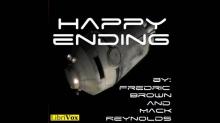 Happy Ending
Happy Ending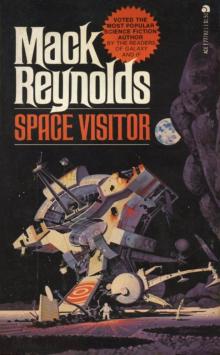 Space Visitor
Space Visitor A Kiss Before Loving
A Kiss Before Loving Episode on the Riviera
Episode on the Riviera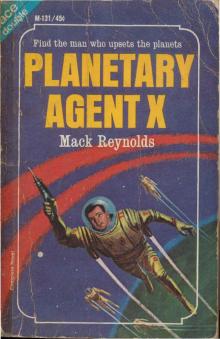 Planetary Agent X
Planetary Agent X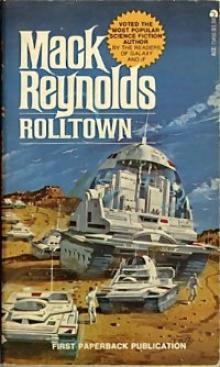 Rolltown bh-3
Rolltown bh-3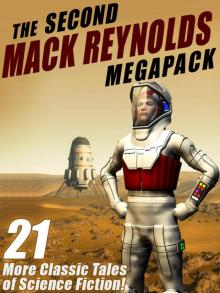 The Second Mack Reynolds Megapack
The Second Mack Reynolds Megapack Dawnman Planet up-2
Dawnman Planet up-2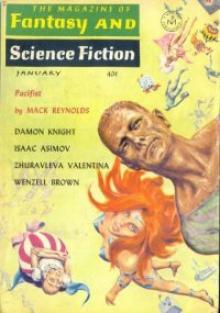 Pacifist
Pacifist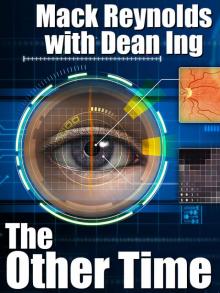 The Other Time
The Other Time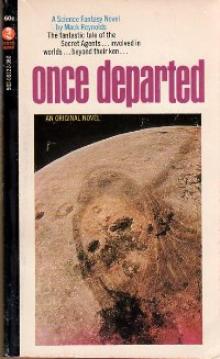 Once Departed
Once Departed IQ
IQ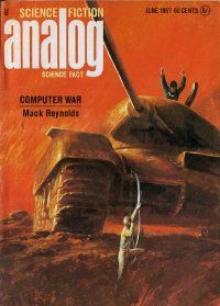 Computer War
Computer War Earth Unaware
Earth Unaware The Rival Rigelians up-3
The Rival Rigelians up-3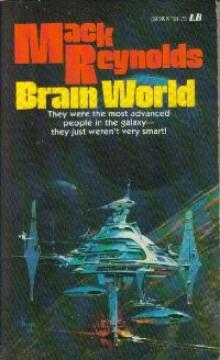 Brain World up-7
Brain World up-7 Star Trek - TOS - Mission to Horatius
Star Trek - TOS - Mission to Horatius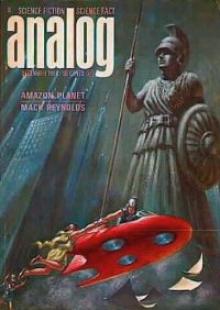 Amazon Planet up-5
Amazon Planet up-5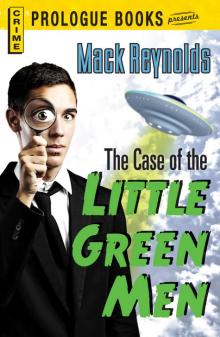 The Case of the Little Green Men
The Case of the Little Green Men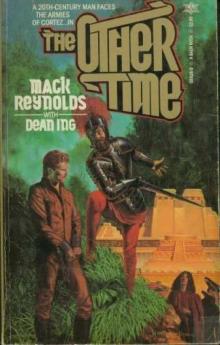 Other Time
Other Time The Mack Reynolds Megapack
The Mack Reynolds Megapack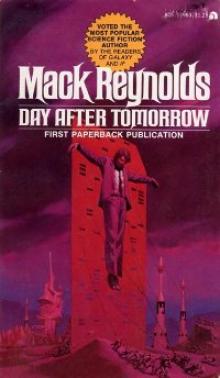 Day After Tomorrow
Day After Tomorrow The Devils & Demons MEGAPACK ®: 25 Modern and Classic Tales
The Devils & Demons MEGAPACK ®: 25 Modern and Classic Tales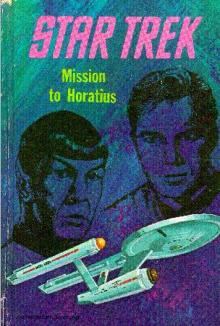 Mission to Horatius
Mission to Horatius Ability Quotient
Ability Quotient Galactic Medal of Honor
Galactic Medal of Honor Trojan Orbit
Trojan Orbit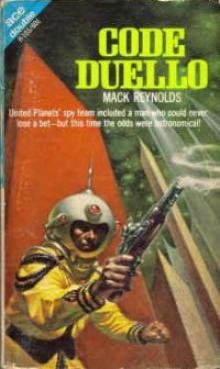 Code Duello up-4
Code Duello up-4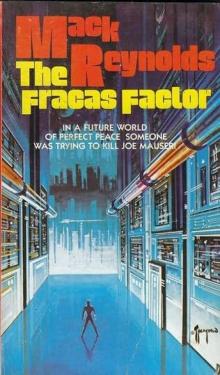 The Fracas Factor
The Fracas Factor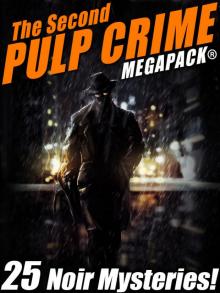 The Second Pulp Crime
The Second Pulp Crime Deathwish World
Deathwish World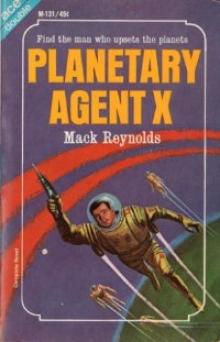 Planetary Agent X up-1
Planetary Agent X up-1 Blackman' Burden na-1
Blackman' Burden na-1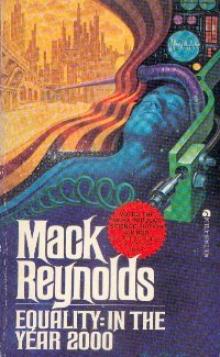 Equality: In the Year 2000 jw-2
Equality: In the Year 2000 jw-2 The Best Ye Breed na-3
The Best Ye Breed na-3 The Jet Set
The Jet Set The Rival Rigelians
The Rival Rigelians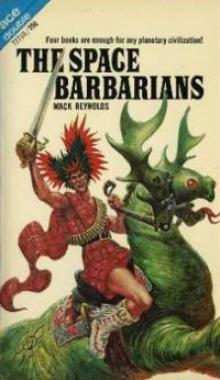 The Space Barbarians
The Space Barbarians